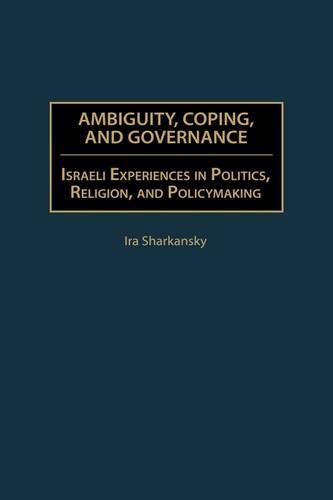
Ambiguity, Coping, and Governance: Israeli Experiences in Politics, Religion, and Policymaking
(Hardback)
Publishing Details
Ambiguity, Coping, and Governance: Israeli Experiences in Politics, Religion, and Policymaking
By (Author) Ira Sharkansky
Bloomsbury Publishing PLC
Praeger Publishers Inc
30th October 1999
United States
Classifications
Tertiary Education
Non Fiction
Central / national / federal government policies
Social and ethical issues
320.95694
Physical Properties
Hardback
216
Width 156mm, Height 235mm
539g
Description
Sharkansky asserts that the use of ambiguity and other forms of coping are more suitable than problem solving in dealing with certain kinds of public problems. However, there are costs as well as benefits associated with these less than perfect ways of policy making. Sharkansky's approach conveys both optimism and pessimism. The bright side is that ambiguity works; the dark side is not so much its disadvantages as the realization that many commentators and practitioners of the craft seem unwilling to recognize its advantages and appear unwilling to promote its use for problems where it might be most useful. Ambiguities surrounding the name of Jerusalem lead to insights and possibilities with respect to the city's future, as well as with respect to other disputes involved in the peace process between Israel and its neighbors. Ambiguities also appear in sophisticated modes of social science, and they raise the question, if research is unclear, can policy making be substantially different As Sharkansky makes clear, there are negative as well as positive aspects to coping and ambiguity, and he suggests ways of dealing with the disadvantages. This frontal attack on widely advocated, conventional modes of thinking about public problems and policy making will be stimulating to students, researchers, and policy makers dealing with Israeli-Arab issues specifically and policy issues generally.
Reviews
.,."Sharkansky has written a noteworthy book that advances our conceptual understanding of ambiguity as a useful strategy in coping with protracted conflicts that are complex and involve deep sensitivities...future policy makers and researchers will not only find this study to be stimulating reading but will also take its lessons seriously into consideration."-Journal of Third World Studies
...Sharkansky has written a noteworthy book that advances our conceptual understanding of ambiguity as a useful strategy in coping with protracted conflicts that are complex and involve deep sensitivities...future policy makers and researchers will not only find this study to be stimulating reading but will also take its lessons seriously into consideration.-Journal of Third World Studies
Sharkansky present's a more balanced view of the difficulties that the Netanyahu administration encounter as a result of Rabin's actions: reaching agreement over Hebron.-Middle East Quarterly
Sharkansky's argument is challenging and well worth presenting, and it certainly should be noted, -American Political Science Review
This book will be most useful as a text for a course in diplomacy and negotiation. There is ample...background material for those unfamiliar with the Arab-Israel conflict or Israel's religious-secular divide.-Jerusalem Post
"Sharkansky present's a more balanced view of the difficulties that the Netanyahu administration encounter as a result of Rabin's actions: reaching agreement over Hebron."-Middle East Quarterly
"Sharkansky's argument is challenging and well worth presenting, and it certainly should be noted,"-American Political Science Review
"This book will be most useful as a text for a course in diplomacy and negotiation. There is ample...background material for those unfamiliar with the Arab-Israel conflict or Israel's religious-secular divide."-Jerusalem Post
..."Sharkansky has written a noteworthy book that advances our conceptual understanding of ambiguity as a useful strategy in coping with protracted conflicts that are complex and involve deep sensitivities...future policy makers and researchers will not only find this study to be stimulating reading but will also take its lessons seriously into consideration."-Journal of Third World Studies
Author Bio
IRA SHARKANSKY is Professor of Political Science and Public Administration at the Hebrew University of Jerusalem. Earlier he taught at the University of Wisconsin-Madison. He has published articles and books on policy making, public administration, politics and religion, American and Israeli politics, including most recently, Policymaking in Israel and Rituals of Conflict.
